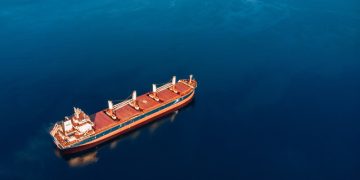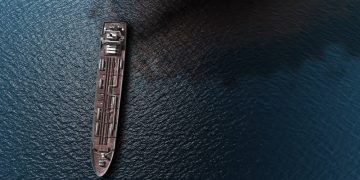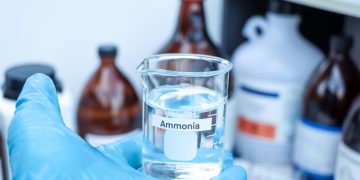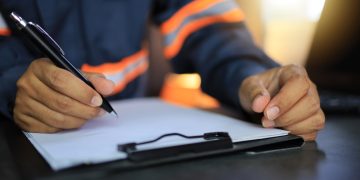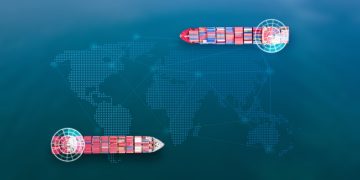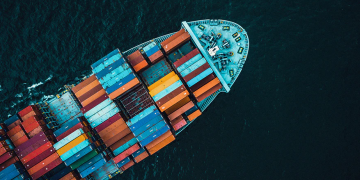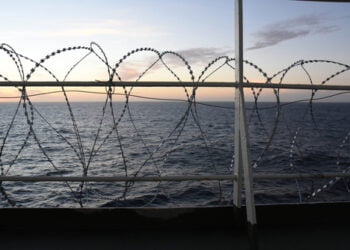With global warming already affecting the world significantly, many industries are facing severe and complex challenges. For this reason, Ansuman Ghosh, Director of Risk Assessment, UK P&I Club, highlights the urgent need for shipping to reduce its emission levels and play its part in addressing this dire situation.
Global warming is one of the most severe and complex challenges our world faces today. There is an urgent need to reduce emission levels and avoid the most devastating impacts of climate change on our food supply, global health, extreme weather and more. Every individual, business, and industry, including shipping, has a part to play.
The need for shipping to decarbonise is real and urgent, but not without its challenges, especially given the technical complexity of the measures being explored to enhance efficiency and/or reduce emissions, and given that the regulations and targets are still evolving. The UK Club continues to support its Members in developing a good understanding of these developments and, following the 76th session of the IMO’s Marine Environment Protection Committee (MEPC 76) from 10 to 17 June 2021, the purpose of this article is to provide a summary of the some of the latest issues and challenges facing ship owners and managers. At a time when the technologies and risks will be changing fast, a close relationship between ship owners and their insurers will be more important than ever, helping both to better understand the new technologies and the new rules, and to navigate the changing green seascape
Patrick Ryan, Sustainability Director, UK P&I Club.
Shipping & climate change timeline
The focus on air emissions in shipping started in 1997 with the eventual introduction of regulations through MARPOL Annex VI in 2005. This focused on pollutants such as nitrogen oxide (NOx), sulphur oxide (SOx), volatile organic compounds, polychlorinated biphenyls, and chlorofluorocarbons. The reduction of SOx emissions has been phased, with the most recent regulations requiring fuel sulphur content to be 0.5% or less from 1 January 2020. NOx reduction targets were achieved by optimisation of the combustion process in diesel engines or by installing dedicated NOx emission control technologies.
Measures to reduce carbon dioxide (CO2) and greenhouse gases (GHG) brings a different set of challenges. The International Maritime Organisation’s (IMO) first major step to reduce carbon emissions was announced in 2011 and by 2013 the industry saw the introduction of two new terms:
- Engine Efficiency Design Index (EEDI) to improve the design efficiency of ships
- Shipboard Energy Efficiency and Management Plan (SEEMP) to improve operational efficiency.
Targets to improve design efficiency (EEDI) of new build ships commenced in 2015 with the next phase of design efficiency targets coming into effect in 2022.
In 2018, the IMO set out its ambitions in its initial Greenhouse Gas (GHG) strategy. It targets a 40% reduction in CO2 intensity by 2030, a 70% reduction by 2050, and a 50% reduction in all GHG by 2050.
The targets have left many Shipowners with an enormous task of achieving compliance. Shipowners may have to review operational efficiencies such as voyage optimisation, introduce technological advancements in ship design, implement reduction in voyage speeds and/or use alternative fuels with a lower carbon footprint.
The green transition and the need to adopt new green practices and technologies quickly will inevitably lead to new risks which, from a loss prevention point of view, will need to be understood, mitigated and hopefully avoided. A strong relationship and good communications between ship owners/operators and their Club will be vital in ensuring that lessons are learned in relation to the emerging technologies and, ultimately, that losses are prevented
Stuart Edmonston, Loss Prevention Director, UK P&I Club.
New builds
Since 2013, the Energy Efficiency Design Index (EEDI) has been a significant measure at driving technical efficiency improvements and reducing carbon emissions from new builds in a phased manner.
Based on the IMO’s 2030 CO2 reduction targets and the measurements achieved from IMO DCS (the IMO introduced data collection (IMO DCS) in 2019), a baseline will be created for each vessel and yearly CO2 reduction targets will be specified to achieve the 2030 target.
As a vessel is expected to have a lifespan of approximately 25 years, new builds are not only expected to comply with greater efficiency requirements as per current EEDI targets, but they also have to consider available alternative fuel options to meet the IMO’s future GHG reduction goals.
Existing Ships
For existing ships above 5,000 GT, CO2 emission monitoring was introduced by the European Union and the IMO, to measure the amount of fuel consumed. The European Union Monitoring, Reporting and Verification (EU MRV) was introduced in July 2015 with data collection taking place from 2018.
This monitoring provides the background and foundation for all future measures, including the IMO’s Energy Efficiency Existing Ship Index or EEXI for existing ships, and mandatory carbon intensity reduction targets (CII) for new and existing ships.
These new regulations will likely apply from 2023 onwards, but their impact is already being felt across the industry. Stakeholders are beginning to acknowledge that the EEXI poses considerable challenges to vessels’ commercial and technical operations. There are also looming regulatory and safety-critical aspects.
The EEXI
In simplistic terms, this new existing ship index (EEXI) represents the application of the design Index (EEDI) to existing ships. Its primary objective is to level the playing field in technical efficiency for new and existing ships.
Existing Ships not meeting the EEXI targets will soon have to consider compliance options to meet their target EEXI values. The options available to them are:
- A reduction in ship’s propulsive power by introducing an Engine Power Limiter (EPL).
- Some ships might consider retrofits of energy efficiency technologies (EETs) such as Mewis ducts, air lubrication, battery or fuel cell auxiliary power, waste heat recovery systems, rotor sails or solar panels, to name a few.
- Retrofitting ships to burn carbon-neutral fuel is another option, but this might not be viable for most existing ships due to very high capital expenditure, especially once vessels’ age and remaining working life is considered.
Installing a power limit will naturally mean reductions in a ship’s manoeuvrability in certain conditions. The ship’s crew needs to be satisfied that they can lower the available power without compromising the vessel’s safety margins and whilst ensuring that they can increase power above the normal limit if/as required in an emergency.
While EEXI is a technical measure requiring one-time certification, the CII would strengthen the requirements to manage the in-service energy efficiency, mandating year-to-year operational efficiency improvement targets. After ships have been certified to comply with the required EEXI, they will have to remain compliant with a downward carbon trajectory up to 2030 and beyond, decreasing their carbon intensity annually from an operational perspective.
By establishing a ship/fleet baseline, comparisons can then be made with trajectories under different scenarios established under the Poseidon Principles. The Poseidon Principles, launched in New York on 18 June 2019, are an agreement reached between the finance sector and the shipping industry to integrate the IMO’s climate related policies into ship finance decision making processes. Specifically, signatories to the Principles have to ensure that their ship finance portfolios are aligned with the goals set out in the IMO’s initial GHG strategy.
Concerns
One burning question in the minds of all stakeholders will be how much further an existing ship’s carbon reduction can go from a technical perspective when the ships have already reduced their installed propulsive power?
A further related concern is that, even after complying with EEXI and CII, ships can still find themselves in the lowest carbon efficiency category; thus, they may still be subject to increased market scrutiny.
All of these, in combination, could theoretically mean that some ships on the water today will meet the IMO’s 2030 emissions target under the EEXI regime, but without necessarily being on track to meet the longer-term requirements. On a positive note this would, to some extent, delay the need to replace ships with unproven technology for the first few years. Eventually, however, the EEXI regime gains will tail off, and then ships will have to move to alternative fuels such as LNG, hydrogen-based liquid fuels, or even electricity.
Recently, the European Parliament voted to include CO2 emissions from shipping within the EU’s Emissions Trading Scheme (ETS). The scheme is set to include all voyages by vessels 5,000 GT and above that start or finish within the EU. It will require vessel operators to purchase carbon permits to cover related emissions. Looking at how other regulations have developed within the industry, schemes assimilate to the ETS might emerge in different regions over the next decade. Varying emission requirements will have enormous challenges for vessel owners and operators.
The upcoming new fuel types, engines, new technology and regulations are going to introduce several new challenges. Thus, appropriate crew training to ensure the competence of the crew to deal with the new technologies/challenges will be a further significant concern. Major incidents have occurred in the past due to a lack of understanding of new technology introduced on a ship, such as when the industry transitioned from paper charts to electronic charts, or when the move was made from conventional diesel engines to electronic engines. Learning from these experiences, for a seamless “green” transition to take place, it is imperative to have a workable framework to adopt the changes well in advance, taking a very cautious approach and utilising risk assessment tools.
Above article has been initially published on UK Club’s website and is reproduced here with author’s kind permission.
The views presented hereabove are only those of the author and do not necessarily those of SAFETY4SEA and are for information sharing and discussion purposes only.





